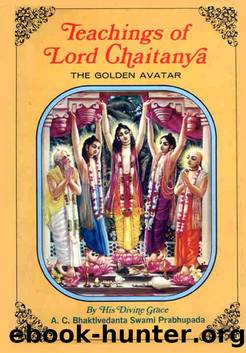Teachings of Lord Caitanya - 1968 Edition -- Prabhupada Books by A.C. Bhaktivedanta Swami Prabhupada

Author:A.C. Bhaktivedanta Swami Prabhupada [Prabhupada, A.C. Bhaktivedanta Swami]
Language: eng
Format: epub
Tags: Philosophy
Publisher: Prabhupada Living Archive
Published: 2010-12-08T13:30:00+00:00
Chapter Sixteen
Conclusion of Teachings to SanÄtana GosvÄmÄ«
There are those who simply desire liberation, those who are liberated already, even while in this material existence, and those who are actually self-realized. There are many persons in this world who desire liberation, and sometimes they engage in devotional service for this purpose. It is corroborated in ÅrÄ«mad-BhÄgavatam (1.2.26) that those who actually desire liberation abandon worship of the demigods, and, without envy, concentrate their minds in the worship of NÄrÄyaá¹a, the Supreme Personality of Godhead. When such persons come in contact with a pure devotee, they engage in the devotional service of Ká¹á¹£á¹a and abandon the idea of liberation. In the Hari-bhakti-sudhodaya it is stated:
aho mahÄtman bahu-doá¹£a-duá¹£á¹o
'py ekena bhÄty eá¹£a bhavo guá¹ena
sat-saá¹ gam Äkhyena sukhÄbahena
ká¹tÄdya no yena ká¹ÅÄ mumuká¹£Ä
"O great soul, although there are many flaws within this miserable life, there is yet one glory-the association of pure devotees. Cultivate such association. By it our desire for liberation diminishes."
In ÅrÄ«mad-BhÄgavatam (11.2.37) it is stated that man's fear is due to his material conception of life and to his forgetting his eternal relationship with the Supreme Lord. Consequently he finds himself having only perverted memories. This occurs due to the spell of material energy. One who has sufficient intelligence will engage himself in full devotional service and regard the Supreme Lord as his spiritual master and worshipable God. The conclusion is that no one can attain a revolution in consciousness without engaging in devotional service to the Lord. When one is actually free from material contamination, he can fully engage himself in Ká¹á¹£á¹a consciousness.
In ÅrÄ«mad-BhÄgavatam (10.14.4) it is again clearly said that one who engages in spiritual life to understand things as they are but who lacks all intentions of engaging in Ká¹á¹£á¹a consciousness, simply achieves trouble for his undertaking. There is no substance to his life. Every living entity is part and parcel of the Supreme Lord, and therefore it is the duty of every living entity to serve that supreme whole. Without such service, the living entity falls into material contamination.
Lord Caitanya concluded His teachings to SanÄtana GosvÄmÄ« by pointing out that the six kinds of ÄtmÄrÄmas engage in some kind of devotional service to Ká¹á¹£á¹a. In other words, at some time or another all the transcendentalists ultimately come to understand the necessity of rendering devotional service to Ká¹á¹£á¹a and become fully Ká¹á¹£á¹a conscious. Even if one is very learned or extravagant, he can still engage in the devotional service of the Lord.
The transcendentalists can be categorized into six basic types: the neophyte transcendentalist, the absorbed transcendentalist, one who is actually situated in transcendence, one who actually desires liberation, one who is actually liberated, and one who is actually engaged in activities in his constitutional position. All of these are called ÄtmÄrÄma. When a person becomes ÄtmÄrÄma, or a great thinker in Ká¹á¹£á¹a consciousness, he fully engages in devotional service. According to the grammatical rules, there are many ÄtmÄrÄmas, but one sense of the word is sufficient to represent the others. In the collective sense, all the ÄtmÄrÄmas are inclined to worship the Supreme Lord Ká¹á¹£á¹a.
Download
This site does not store any files on its server. We only index and link to content provided by other sites. Please contact the content providers to delete copyright contents if any and email us, we'll remove relevant links or contents immediately.
The remains of the day by Kazuo Ishiguro(8981)
Tools of Titans by Timothy Ferriss(8369)
Giovanni's Room by James Baldwin(7330)
The Black Swan by Nassim Nicholas Taleb(7111)
Inner Engineering: A Yogi's Guide to Joy by Sadhguru(6785)
The Way of Zen by Alan W. Watts(6603)
Asking the Right Questions: A Guide to Critical Thinking by M. Neil Browne & Stuart M. Keeley(5762)
The Power of Now: A Guide to Spiritual Enlightenment by Eckhart Tolle(5760)
The Six Wives Of Henry VIII (WOMEN IN HISTORY) by Fraser Antonia(5505)
Astrophysics for People in a Hurry by Neil DeGrasse Tyson(5182)
Housekeeping by Marilynne Robinson(4436)
12 Rules for Life by Jordan B. Peterson(4299)
Double Down (Diary of a Wimpy Kid Book 11) by Jeff Kinney(4261)
Ikigai by Héctor García & Francesc Miralles(4247)
The Ethical Slut by Janet W. Hardy(4243)
Skin in the Game by Nassim Nicholas Taleb(4240)
The Art of Happiness by The Dalai Lama(4125)
Skin in the Game: Hidden Asymmetries in Daily Life by Nassim Nicholas Taleb(3993)
Walking by Henry David Thoreau(3953)
